Writing Routines for Real People: Part 2
Writing routines are tricky for anyone, but as someone who is neurodivergent, writing routines feel like an extra challenging task sometimes. I’m autistic and have ADHD, so my brain simultaneously craves chaos and rigorous structure, which so often leads me to absolute paralysis. It also means that most writing advice on crafting a steady writing routine often falls short for me.
So I suppose my best writing routine advice and the best kind of writing routine I would encourage you to find for yourself is the one that works for you.
Kendall Davis, SPS Consultant
I know that sounds like throwaway advice, but stick with me here. Sticking to a writing routine isn’t just about blocking out time on a calendar and sitting in front of your computer every time you have a writing block set aside during your day.
There are a lot of things about a sustainable writing routine that have to do more with vibes and your mood than how much time you have in your day. When you think about a time in your life where you wrote consistently and you were able to craft words that felt good and like you were headed in a good direction, what were you doing? What weren’t you doing? I don’t just mean what kind of schedule you built. I mean where were you physically doing the writing? Were you inside or outside? Were you listening to music? Drinking coffee? Eating food? In a library? Surrounded by strangers, friends, or alone?
So much time and effort is spent telling writers to carve out time in their schedule for writing, and oftentimes the things that can be the biggest hindrance to writing aren’t focused on enough.
Sure, the old saying of, “you can edit bad writing, but you can’t edit nothing,” is true, but nothing feels worse than jumping out of a writing session having barfed out a bunch of garbage words so you can tell yourself you get to cross something out on your to-do list. Blocking out time on your calendar is really only half the battle here, and if you can pay attention to and honor the other aspects of the writing process that impact your writing, you’ll find yourself able to use your writing time more effectively and not feel like you’re constantly having to wrestle yourself into submission to get to the keyboard.
Remember, no one knows yourself better than you.
Give yourself the time to think about what you need to write well. There is no accommodation that you can make for yourself that is too specific or too silly. When you factor this into building a writing routine that works for you, you are remembering to honor what your body needs to be able to shut off everything else (or at least quiet things a bit) and focus on your writing.

